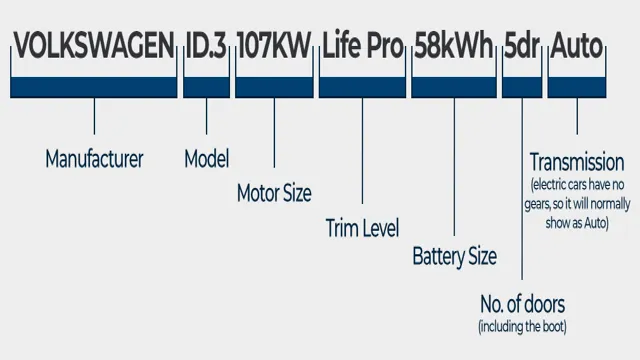Unlock the Language of Electric Cars: Your Ultimate Guide to Electric Car Terminology
Electric cars are becoming increasingly common on the roads today. However, with this new technology come new terms and definitions that can be confusing for those unfamiliar with the industry. If you’re thinking about buying an electric car or just interested in learning more about this innovative mode of transportation, this electric car terminology guide is just what you need! This guide will provide you with a comprehensive understanding of the language used in the electric vehicle (EV) industry, making it easier for you to understand discussions about the environmental impact of EVs, charging stations, and battery technology.
So, let’s dive in and explore the world of electric vehicles together!
Why You Need It
If you’re new to the world of electric cars, you’ll quickly discover that there are countless terms and abbreviations to learn. Even if you’ve been driving electric vehicles for a while, it can be tough to keep up with all the new developments and terminology. That’s why you need our electric car terminology guide.
Our guide breaks down all the most important terms and concepts you need to know to make informed decisions about your electric car purchase. From battery capacity and charging speeds to regenerative braking and torque, we cover it all. When you’re armed with this knowledge, you’ll have the confidence to ask the right questions and make an informed decision about your next electric vehicle.
Don’t let confusing terminology hold you back from enjoying the many benefits of driving electric. Start with our guide today.
Understand Complex Battery Technology
Understanding complex battery technology can be extremely beneficial in today’s technological landscape. With the increasing demand for portable and rechargeable devices, batteries have become an essential component of our daily lives. However, not all batteries are created equal, and understanding their intricacies can make all the difference.
By comprehending the complexities of battery technology, you can choose the right battery for your device, prolong its lifespan, and increase its efficiency. Additionally, understanding battery technology will enable you to make an informed decision when purchasing batteries, guaranteeing that you get the most bang for your buck. Whether you are a tech-savvy consumer or a professional in the industry, learning about complex battery technology is undoubtedly worth your while.

Efficient Charging Techniques
Efficient Charging Techniques are essential nowadays to keep our devices charged quickly and efficiently. With our busy lifestyles, we cannot afford to wait for hours to charge our phones, laptops, or tablets. Fast charging is now the norm, and manufacturers are trying to develop new ways to speed up the charging process.
Efficient charging techniques are not only fast but also save energy and battery health. If the charging process is too slow or inefficient, it can damage the battery life, reducing its lifespan. Therefore, it is necessary to use efficient charging techniques that balance the charging time and battery health, which in turn will save you time and money in the long run.
The Benefits of Energy Recuperation
Energy recuperation is becoming increasingly popular in today’s world due to its great benefits. It’s a process of recovering and reusing energy that’s lost during different operations. One of the benefits of energy recuperation is that it helps reduce energy costs.
The recovered energy can be used in other operations, reducing the overall energy use and cost. It’s a great way to improve efficiency and maximize the use of available resources. Additionally, energy recuperation helps reduce carbon emissions, which is extremely important in today’s world where climate change is a major concern.
By reusing energy that would have been wasted, we’re able to reduce our carbon footprint and contribute towards a greener future. Overall, incorporating energy recuperation in different operations is a smart and responsible choice for any organization or individual looking to reduce costs and help the environment.
What’s Included
If you’re new to the world of electric cars, the terminology can be overwhelming. That’s why you need our electric car terminology guide. We’ve got you covered with all the essential terms and phrases, from regenerative braking to range anxiety.
Our guide will also cover key components of electric vehicles, such as the battery, motor, and charger. Plus, we’ve included common acronyms and abbreviations like BEV and PHEV. You’ll gain a better understanding of what makes electric cars unique and how they work.
And, you’ll be able to talk about them with confidence, whether you’re chatting with fellow EV enthusiasts or shopping for your own electric ride. Get ready to power up your electric car knowledge with our comprehensive guide!
Definitions of Key Terms & Phrases
In this blog section, we will cover some of the key terms and phrases related to the topic at hand. Understanding these definitions is crucial for gaining a comprehensive understanding of the subject and being able to communicate effectively about it. Some of the terms we will define include perplexity, which refers to the measure of how uncertain or surprised a model is when predicting an outcome.
This is important because it can help us understand the accuracy of a model’s predictions. Another term we will define is burstiness, which describes the tendency for certain events or data points to occur in clusters, rather than being evenly distributed over time. This concept is essential for analyzing patterns in data and being able to make predictions based on those patterns.
By gaining a solid grasp of these terms and phrases, we can develop a deeper understanding of the subject matter and communicate it clearly and effectively to others.
Explainer Graphics & Illustrations
If you’re looking to spice up your content and make it more engaging, explainer graphics and illustrations are a great addition to consider. These visuals can help break down complicated concepts or ideas in a simple and fun way, making it easier for your audience to understand and retain information. At our company, we provide a wide range of options for explainer graphics and illustrations, including flat designs, isometric images, and hand-drawn illustrations.
Our team works closely with you to ensure the graphics match your brand’s style and voice while conveying your message effectively. These visuals can be used in a variety of content, including blogs, social media posts, presentations, and more. By incorporating explainer graphics and illustrations into your content, you can enhance its visual appeal, improve engagement, and ultimately, boost your audience’s understanding of your brand and offerings.
Real World Examples & Scenarios
Real world examples and scenarios are an essential component when learning a new skill or concept. When it comes to artificial intelligence, real-world examples and use cases can help individuals and businesses understand how AI can be utilized in their daily operations. Some real-world examples of AI in action include chatbots that provide customer service, self-driving cars that use machine learning algorithms to navigate traffic, and predictive maintenance systems that help manufacturers avoid equipment breakdowns.
Additionally, AI can be used in healthcare to diagnose diseases and help doctors make informed decisions about treatment options. By examining real-world examples of AI, businesses and individuals can gain a better understanding of the potential benefits of this technology and how it can be implemented in practical ways.
How to Use the Guide
If you’re considering buying an electric car, you need our electric car terminology guide. Electric vehicles (EVs) are becoming increasingly popular, but the terminology can be overwhelming and confusing. Our guide breaks down everything you need to know into simple, easy-to-understand terms.
From understanding the difference between a hybrid and a fully electric car to decoding the various charging options, our guide covers it all. You’ll learn about the different types of batteries, how regenerative braking works, and the importance of range anxiety. By the time you finish reading our guide, you’ll feel confident and knowledgeable when it comes to the language of electric cars.
Don’t let confusing terminology hold you back from taking the leap into a more sustainable mode of transportation. Get started with our guide today.
Quick Reference for Common Terminology
As the fields of technology and science continue to advance, new terminology and jargon can be overwhelming. It can be difficult to keep up with all of the acronyms, abbreviations, and technical terms being thrown around. That’s why we’ve created this quick reference guide for common terminology.
This guide will provide a clear and concise explanation of frequently used terms, allowing you to better understand the latest developments in your field and communicate effectively with colleagues and clients. So whether you’re an expert in your industry or just starting out, this guide is a valuable resource for anyone looking to stay up-to-date with the most important terms and concepts.
In-Depth Reading for Advanced Knowledge
If you’re looking for advanced knowledge on a particular topic, our In-Depth Reading Guide can serve as an invaluable tool. To use the guide effectively, start by identifying your area of interest, and then browse through the various categories and subcategories within the guide. Each section includes a brief description of the topic and a list of recommended readings, so you can quickly identify the resources that are most relevant to your needs.
Whether you’re a researcher, student, or simply someone with a curious mind, the In-Depth Reading Guide can help you expand your knowledge and uncover new insights. So why not take a look and see what you can discover?
Get Your Copy Today
If you are looking to learn more about electric cars, you need our electric car terminology guide. This guide is specifically designed for beginners who want to understand the complex terminology used in the world of electric cars. It is easy to get overwhelmed when you are trying to learn about electric cars, especially if you are not familiar with the technology.
Our guide breaks down all of the important terms and concepts in an easy-to-understand language. From regenerative braking to EVSE, we cover it all. You can read this guide on your own time and come back to it whenever you need a refresher.
Plus, it will help you navigate any conversations about electric cars with more confidence. So if you want to learn all about electric cars, grab your copy of our electric car terminology guide today.
Conclusion
In conclusion, if you’re considering purchasing an electric car, you’ll quickly realize that the terminology used by industry experts can be overwhelming and confusing. Don’t worry, though – that’s where our electric car terminology guide comes in! With witty and clever explanations of all the jargon you’ll need to know, you’ll be talking like an EV pro in no time. So why not give it a read and electrify your vocabulary?”
FAQs
What is an electric vehicle?
An electric vehicle is a type of vehicle that powered by an electric motor and batteries instead of a traditional internal combustion engine.
What is regenerative braking?
Regenerative braking is a system that converts the kinetic energy generated during braking into electrical energy that can be used to recharge the vehicle’s battery.
What is the range of an electric car?
The range of an electric car refers to the distance it can travel on a single charge. It varies depending on the specific model but can range from 80 to 300 miles or more.
What is the difference between a plug-in hybrid and an electric car?
A plug-in hybrid has both an electric motor and a gasoline engine, while an electric car is solely powered by an electric motor. Plug-in hybrids can be charged from an outlet but also have an onboard gasoline engine for extended driving range.



